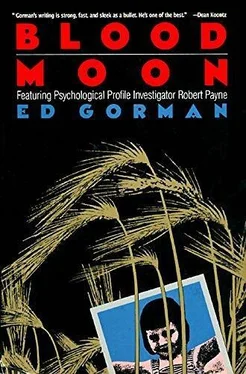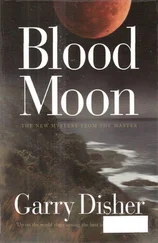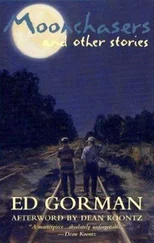“Lasted two months. Two damn months is all. Then he was back to the bottle.”
These were two of the suits sitting at the counter. McNally was one of the men mentioned in Mike Peary’s letter as a possible suspect. They had me curious. He appeared to be missing, presumably on a drunk. From Mike’s profile, a man who drank a lot — maybe to suppress the memories of what he’d done — would fit perfectly.
I paid my bill and went outside and stood on the corner for a few minutes, enjoying the spring air.
There was a phone booth across the street. I walked over and looked up the name McNALLY, RICHARD.
I got the address and drove out there. The town was laid out on an extensive grid broken only by the public square downtown. Railroad tracks cut north-south.
The houses were eclectic, everything from small Queen Annes to what they used to call “Corn Belt” homes, square white clapboards of two stories with the inevitable squeaking swing on the inevitable front porch. The pastel prefabs that came in after WWII looked a lot older than the houses built eighty, one hundred years ago.
The McNally place was a small white clapboard sitting in the middle of a green, green acre with a windbreak of shade trees and an aged but sprightly red barn in back. It was out on the north edge of town. The yard was carefully mown and well-tended, magnolia trees and apple blossoms charging the air headily.
I knocked. Inside a dog barked, and then a soft voice shushed it. And then she was there, framed in the glass of the storm door. She looked to be about my age, and probably not quite at her ideal weight, maybe five, six pounds over on a very slight frame, with silken dark hair and silken dark eyes, the left one spoiled by the fading remains of a black eye. She looked scared and miserable but even so, appealing in a kind of sad way, the sort of woman you try hard to make happy because you suspect she’s never been happy before.
Of course, unhappiness was a tradition among pioneer women out here. Despite all the macho cowboy movies, women pretty much kept things running on the frontier. Sure, the men had to plow and till the fields and hunt the meat, but study up on pioneer women, and you’ll see why the suicide rate was so high among them — eighteen-, twenty-hour days seven days a week during which they did everything from making dyes for coloring cloth from barks and berries and roots; making clothing on a loom; making all meals; tanning hides and cutting patterns out for shoes; washing, ironing, mending; taking total responsibility for a brood of kids that probably ran to seven or eight; giving her man sex on demand; being priest, doctor, teacher; and in her “spare time” pitching in and helping with the planting and, later on, the harvest.
The woman in the doorway looked like a lineal descendent of those pioneer women.
“Hi,” I said.
“Hi.”
“That’s a nice dog.” And it was, a golden retriever with a sweet-sad face that made you smile while it was breaking your heart. Beyond Eve, I got a glimpse of an inexpensively but very handsomely appointed home. The homey smell of baking came from the kitchen.
“Sara. She’s the gentlest animal I’ve ever known.” She relaxed enough to lean down and pet the slender dog on the head. Sara’s tongue licked her fingers pinkly with quick gooey love. “Why can’t everybody be as sweet as you, honey?” the woman asked her dog. She stood straight and looked at me. “I’ve got some cookies in the oven, so I’m in kind of a hurry. Can I help you with something?”
“I’m looking for Richard McNally.”
Fear became more pronounced in her eyes. “Richard McNally is my husband.”
“My name’s Hokanson. I’m a free-lance writer.”
“I don’t know what you could want with my husband. He sells gourmet honey.”
“But I understand he travels.”
“Yes,” she said. Now suspicion joined fear. She seemed to stiffen her entire body inside her designer jeans and prim white blouse. “Of course he travels. How else would he make his sales?”
“Well, that’s why I’m in town for the next few days. I’m doing a piece on how small Iowa towns are becoming bedroom communities, with a lot of people commuting to their work.”
“Oh. I see.” That seemed to calm her some.
“Maybe I could find him at the office?”
She shook her head. “No. He’s — gone. Anyway, he doesn’t have an office. He just works out of the house here.”
“I see.”
“What’s your name?”
“Hokanson. Jim Hokanson.”
“And you’re with—?”
“I’m a free lancer. I’m writing this for Fenroe Publishing. I’m on a kind of retainer setup with them.”
I dug out a card and handed it over to her. Obviously, she wasn’t as yet completely satisfied with my little tale. She’d probably dial that Chicago number and probably talk to somebody at good old Fenroe Publishing, Inc., but she’d probably never figure out that it was nothing more than a small room in a small office building in a bad section of Chicago used by the Agency as a cover for many of its domestic people. Even though I was officially separated, they still let me use it when I needed to.
She looked straight at me and said, “I don’t believe you.”
“About me being a free lancer?”
“Right.”
“Why not?”
She shrugged. “I don’t know.” She paused. Handed the card back. “I want you to leave.”
“But ma’am, I—”
“You don’t have any right to be here. And when I ask you to leave, that’s what you should do.”
“But ma’am, I—”
She leaned down and took Sara by the collar and eased her back beyond the threshold. Then she slammed the door shut.
I stood there feeling like an Amway salesman on a very bad day.
A moment later, apparently thinking I’d left already, or unable to restrain herself, she began sobbing.
It got to me. I wanted to go in there and hold her and just let her cry. She needed somebody to do that for her. I was like that after Kathy died.
On the sidewalk, I turned and started back toward town, watching a golden butterfly sit tentatively on a hedge already occupied by a quick bright cardinal. There were days when I wanted to be a boy again, when my biggest concern was where to find an even bigger steelie than the one I had, and when the next Batman would make its appearance down at Choate’s Rexall pharmacy.
Before I got three steps, a gray car pulled up to the curb and a gray little man stepped out of it and walked quickly toward the McNally home. He too had a Sears suit on, a brown one. He wore a buff blue shirt and a yellow tie. It seemed to me that this kind of getup should be illegal. I wasn’t exactly a dandy, but not even a blind guy could be excused for wearing this particular combo.
I stopped him. “Are you going to see Mrs. McNally?”
He seemed confused. “Yes. Why?”
I shook my head. “She’s not in a visiting mood right now.”
“Is something wrong?”
“Just some family problems.”
“Oh,” he said. “Oh. Then that makes sense.”
“What makes sense?”
“Are you a friend of the family?”
I nodded.
“I’m Don Murphy, assistant principal at Wilson Middle School. Where Melissa goes.”
“Oh, yes.”
“Well, she hasn’t been there for nearly a week and we’ve been very concerned. We’ve talked with Mrs. McNally on the phone a few times and she assured us that Melissa would be back soon but — well, it seemed more appropriate to just drive out here today rather than waste any more time on the phone.” He grimaced. “Family problems?”
I nodded.
“The husband, as usual, I suppose? No offense.”
“No offense.”
“She’s such a decent woman,” he clucked. “And Melissa’s just about a perfect student.”
Читать дальше









